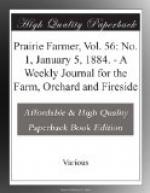St. Louis Wire Fence Co., St. Louis, Mo.
J.H. Lawrence & Co., Sterling, Ill.
North Western Barb Wire Co., Sterling, Ill.
Novelty Manufacturing Co., Sterling, Ill.
Sandwich Enterprise Co., Sandwich, Ill.
Robinson & Hallidie, San Francisco, Cal.
The Hazard Manufacturing Co., Wilkes Barre, Pa.
Worcester Barb Fence Co., Worcester, Mass.
* * * * *
When Glidden & Ellwood first began the sale of the Glidden fence, which was confined to the vicinity of DeKalb, they received 25 cents per pound for the barbed wire. Since then, as production has increased and the facilities for manufacturing have been multiplied and perfected, the price has gradually dropped, until now a farm can be well fenced for forty-five cents, or less, per rod, and to the incalculable advantage of the country over fencing by posts and boards, hedges or rails, as any one may see by a simple dollar and cent comparison of materials at his own door.
* * * * *
Barb-wire has done much for the city of DeKalb. It has built its fine business blocks and residences, and it has peopled it with industrious, thrifty citizens. It has made a home market for many of the products of the country ’round about. It should give a new name, “Barb City,” to the bustling, busy town. There are three concerns now making barb-wire at this point. The one spoken of is the largest. Next is that of Jacob Haish, an extensive establishment, turning out an excellent wire, and the Superior, run by Mr. Hiram Ellwood, Mr. Glidden having a considerable interest in it.
* * * * *
Mr. I.L. Ellwood is the owner of some 2,600 acres of land in the vicinity of DeKalb. Much of this land is naturally low and wet. The proprietor, with his accustomed energy and intelligence, has set vigorously to work to reclaim it. To this end he has already laid eighty miles of tile. He last year expended nearly $15,000 in this work. His poorest land is rapidly becoming his most productive. Mr. Ellwood has also turned his attention somewhat to horse-breeding, and he is now the owner of a fine stud of draft-horses, the equal of many better-known establishments of the kind in the State. Of his drainage operations we hope to speak more in detail in a future number.
* * * * *
Mr. Glidden told the writer that his first trial of his fence with stock was not undertaken without some misgivings. But he thought to himself, “It will stop them, at any rate, whether it kills them or not.” So he took down an old board fence from one side of his barn-yard, and towards night when his stock came up, turned them into the yard as usual. The first animal to investigate the almost invisible barrier to freedom was a strong, heavy grade Durham cow. She walked along beside the wires for a little put her nose out and touched a barb, withdrew it and took a walk around the yard, approached the wires again and gave the barbs a lap with her tongue. This settled the matter, and she retired, convinced that the new-fangled fence was a success.




